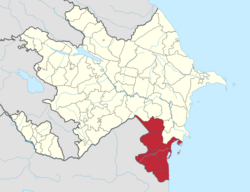This is an old revision of this page, as edited by Parishan (talk | contribs) at 06:02, 13 April 2007 (more detailed info from the CE). The present address (URL) is a permanent link to this revision, which may differ significantly from the current revision.
Revision as of 06:02, 13 April 2007 by Parishan (talk | contribs) (more detailed info from the CE)(diff) ← Previous revision | Latest revision (diff) | Newer revision → (diff)

The Talysh-Mughan Autonomous Republic (also known as Talyshstan) was a short-lived self-proclaimed autonomous republic in Azerbaijan, that lasted from June to August 1993. It was located in extreme southeastern Azerbaijan, envisaging to consist in the 6 administrative districts of Azerbaijan around the regional capital city Lankaran: Lankaran, Lankaran rayon, Lerik, Astara, Masally and Yardymli. Historically the area had been a khanate, one of 15 historic Azerbaijani khanates.
The autonomous republic was proclaimed amid political turmoil in Azerbaijan, with the tacit support from Russia. In June 1993 a military rebellion against president Abulfaz Elchibey broke out under the leadership of Colonel Surat Huseynov. Colonel Alikram Hummatov (Alikram Gumbatov), the leader of the Talysh nationalists, seized power in the southern part of Azerbaijan and proclaimed the new republic in Lankaran, escalating violence. However, as the situation settled and Heydar Aliyev rose to power in Azerbaijan, the Talysh-Mughan Autonomous Republic, which failed to gain any significant public support, was swiftly suppressed.
Hummatov was arrested and initially received death sentence which was subsequently commuted to life imprisonment. In 2004 he was pardoned and released from custody under pressure from the Council of Europe. He was allowed to emigrate to Europe after making a public promise not to engage in politics. Gumbatov was expected to be released due to the amnesty proclaimed on Azerbaijan's International Solidarity Day (December 31, 2000). However this never happened. Today, a Talysh National Movement is still active, their aspiration being the restructuring of the Talysh-Mughan Autonomous Republic. However, those who were involved in proclamation of the autonomy say they always envisaged the autonomous republic as a constituent part of Azerbaijan.
TMAR should not be confused with Mughan Soviet Republic, a Bolshevik state, that existed in March-June 1919 in opposition to Musavatist Azerbaijani Government in Baku (see Azerbaijan Democratic Republic).
According to some, the Azerbaijani government has also implemented a policy of forceful integration of some minorities, including Talysh, Tat, Kurds and Lezgins. However according to the Council of Europe:
- Azerbaijan has made particularly commendable efforts in opening up the personal scope of application of the Framework Convention to a wide range of minorities. In Azerbaijan, the importance of the protection and promotion of cultures of national minorities is recognised and the long history of cultural diversity of the country is largely valued;
- The Nagorno-Karabakh conflict and its consequences have considerably hampered efforts to implement the Framework Convention. Despite the general spirit of tolerance in Azerbaijan, the continued occupation of large parts of Azerbaijani territory and the displacement of a high number of people have caused tensions which have resulted in disconcerting manifestations of intolerance. It is to be hoped that a lasting and peaceful solution to the existing conflict will be found and that efforts to that effect will be accelerated. The eventual solution should protect the rights of all persons concerned, in conformity with the territorial integrity of the country and other principles of international law;
- Certain general human rights issues - including concerns as regards freedom of expression and the process of registration of non-governmental organisations - have an impact also on the protection of national minorities and need to be addressed by the authorities as a matter of priority;
- Despite certain positive legislative initiatives, there are a number of shortcomings in the legislation pertaining to the implementation of the Framework Convention. The 2002 Law on the State Language contains regrettable reductions in the legal guarantees relating to the protection of national minorities. These put at risk, for example, certain commendable practices in the field of electronic media. The process of amending the said law should be pursued further with a view to making it compatible with the Framework Convention;
- There is a need to couple the Law on the State Language with improved legal guarantees for the protection of national minorities in such fields as minority language education and use of minority languages in relations with administrative authorities, with a view to consolidating and expanding the positive practices that exist. Priority should be given to the adoption of a new law on the protection of national minorities, providing the necessary guarantees for the implementation of the relevant minority language standards;
- Azerbaijan should consider developing further the consultation structures for representatives of national minorities in order to improve their participation in decision-making.
References
- ^ BBC News. Azerbaijan in a stir over political prisoner
- Christina Bratt (EDT) Paulston, Donald Peckham, Linguistic Minorities in Central and Eastern Europe, Multilingual Matters. 1853594164, pg 106
- Council of Europe, Committee of Ministers, Resolution ResCMN-2004-8, on the implementation of the Framework Convention for the Protection of National Minorities by Azerbaijan, Adopted by the Committee of Ministers on 13 July 2004 at the 893rd meeting of the Ministers Deputies.